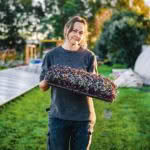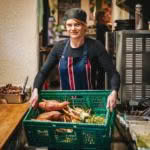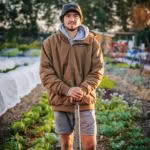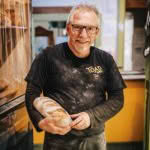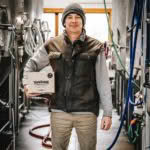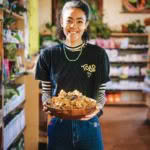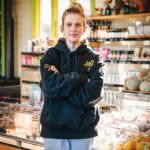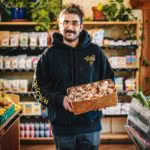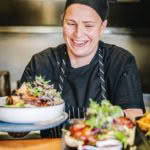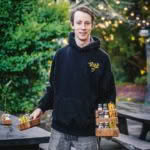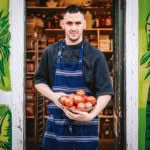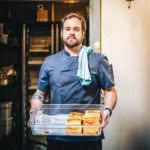Meet Angie of T.O.A.D Hall – The woman behind the best café in New Zealand
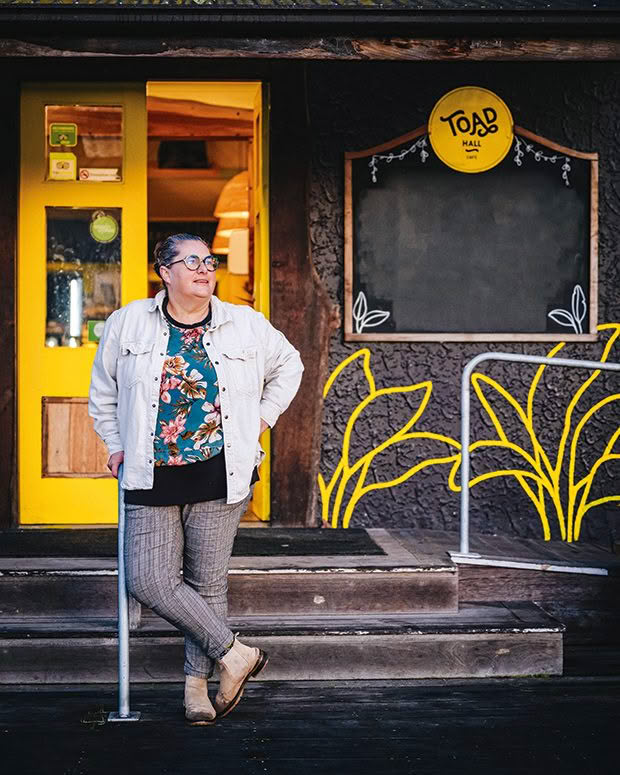
Angie Morris, on the steps of her busy café and provisions store on Motueka’s High Street.
In a town of 8300 residents, a popular café sometimes feeds 1400 people in a day and is so successful it was recently named Best Café in New Zealand. Its creator wonders how it all happened.
Words: Kate Coughlan Photos: Daniel Allen
Occasionally, on a summer’s day, there’s a moment when time stands still for Angie Morris. It happens when her business T.O.A.D Hall, in the small town of Motueka, is humming.
It could be chaos, but it is not. With 100 staff on the summer payroll and 1400 customers coming through her door daily to be fed, coffeed, wined, to enjoy a real fruit ice cream or a glass of cold-pressed juice, Angie stands at the pass and feels as though she is conducting an orchestra.
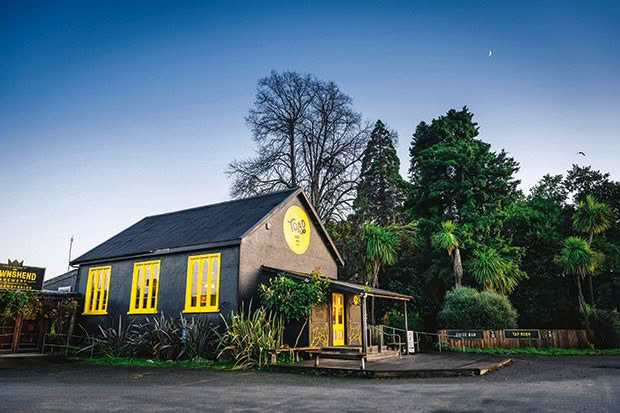
There aren’t many times when the car park of The Old Anglican Diocesan Hall (T.O.A.D Hall) isn’t full of cars, except at dawn on a winter’s day.
“The place is vibrating with such energy it’s like a tuning fork. Since we opened our doors, people have been pouring in relentlessly. We’re really under the pump; dishies are washing dishes faster than ever before, prep chefs are chopping and mixing faster than they ever thought possible, and the chefs are heating, cooking and plating food as fast as they can.
“I stand there making sure that table 10 gets their beef brisket and chicken burger in a timely fashion just as ordered — ‘bun on the side, no aioli, salad on a separate plate, please’.
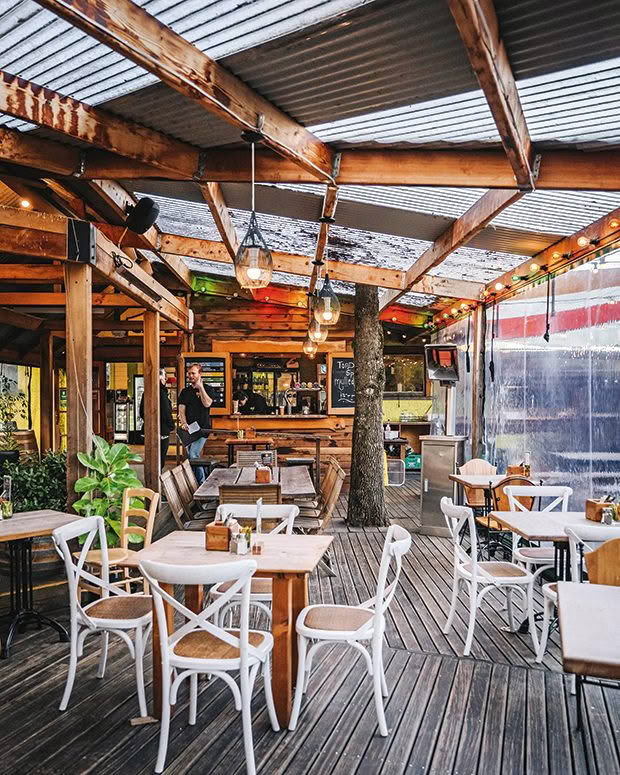
The verandah in front of the bar is the place to be when the sun begins to heat up. In winter, log fires and heaters do their thing.
“It is a wonderful feeling that every little part of this beehive is working perfectly, and that can only happen when all our people are doing everything just right — from the staff stocking the shop that morning, the gardeners harvesting, washing and delivering the chef’s exact needs for the day and all the wait staff looking after tables.
“When I begin training new staff in winter, I wish I could transport them into that moment, so they comprehend when I say, ‘You need resilience to cope with this place at full steam.’”
Angie Morris and her husband Hamish Fletcher took over a fruit and veggie shop on Motueka’s main street in 2007. (The building belonged to the Anglican church in a previous life, and T.O.A.D Hall is an acronym of The Old Anglican Diocesan Hall.) The house that went with the business attracted Angie more than the shop, as it was big enough for their brood of four (all now long flown the nest).
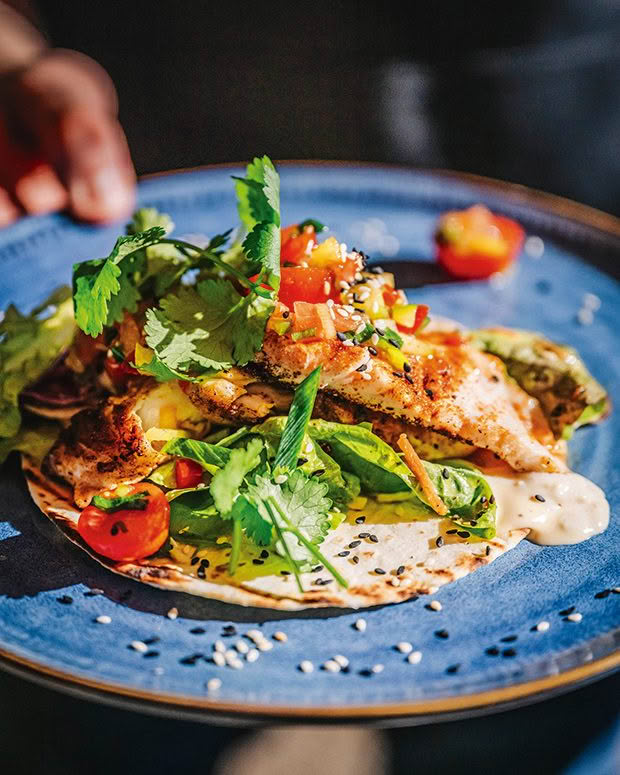
A popular snack menu item is a fish taco garnished with coriander picked from the garden that morning.
She and Hamish, both former police officers, arrived from South Canterbury, where Hamish left the force to take over the family farm south of Tīmaru, and Angie worked at the local station before giving up to home-school their children. Later, the family moved north so the kids could attend the Motueka Steiner School.
The greengrocer shop, the generous villa that came with it, and the large market garden that provided most of the shop’s veggies were, despite being Wakatu leasehold property, more than Hamish and Angie could afford. Helpfully and generously, each set of their parents put in money.
Within a month of running the greengrocery, Angie realised that if she were turning over $150 a day, she was nowhere near achieving the business’ $600,000 turnover on the books. It shocked her, and she said to herself: “We have just borrowed 100 per cent to buy this place with our parents as guarantors. I cannot go broke. I have four little kids and need to start paddling seriously.”
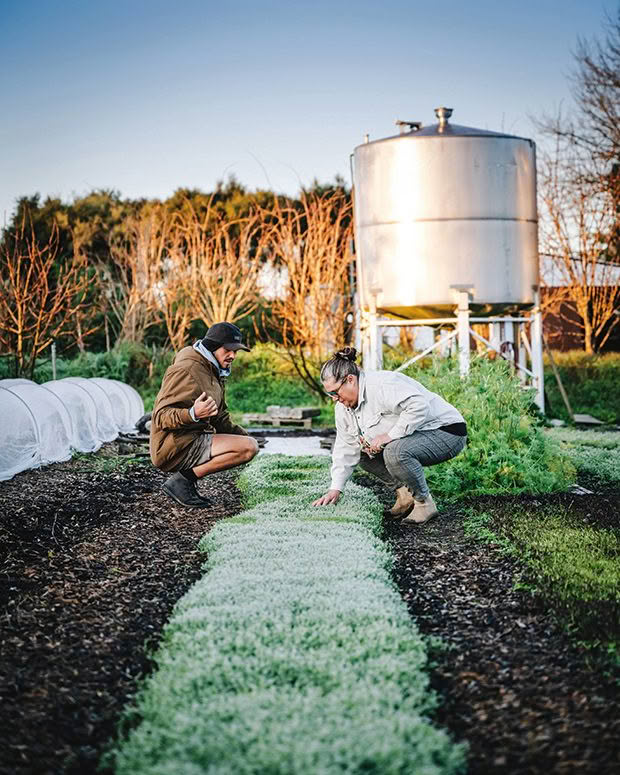
Angie and gardener Sage Campbell check the readiness of snowpea shoots, used in significant quantities in the café.
Paddling fast was something the diminutive Angie, Westport-born and educated and a competitive Ironman triathlete, knew she could do. Literally and mentally. She’d joined the police not for love of a uniform nor passion for policing but for adventure. Soon after graduation and annoyed at the number of exams that needed passing in the first two years as a police officer, she took them at a blistering pace, passing the lot in a record three months. That drew the attention of the New Zealand Police Dive Squad, looking to recruit its first female squad member.
“I think they looked at the exam thing and reckoned I was keen to climb the ladder — I wasn’t. I just couldn’t be bothered having all those exams before me. So when the dive squad head asked me to join, I said, ‘Ok, sure,’ without giving it any thought. There was no career ambition involved; I just thought it’d be an adventure.”
- Zoe Mitchell carries a tray of radish micros.
- Chef Ruth Siciley gathers ingredients for the fish-of-the-day special.
- Sage Campbell prepares a bed for planting yet-more salad greens, an almost daily occurrence.
- Baker Richard Brett works from 7pm five days a week, often finishing 12-14 hours later, and makes all breads and cabinet goods, including vegan slices and cakes. Angie says he is an extremely hard worker and an integral part of the business.
- Also working from the site is brewer Martin Townshend, whose craft beers are sold in the café.
The Royal New Zealand Navy trains police divers, and in the pre-PC days of the early 1990s, it was immediately clear to Angie that she would not graduate. In fact, no police officers had graduated as divers in the several years of intake trainees before Angie’s class of 1992.
“It started on my first day at the Devonport Naval Base, standing to attention in a lineup of army, navy, customs and police trainee divers with the navy guy, his face right in mine, screaming, ‘Morris, this course isn’t for women, so go home and tell all your friends we don’t want women here.’ In those days, anything went, and here I am, physically a little squirt, facing an abusive attitude every minute of every day.”
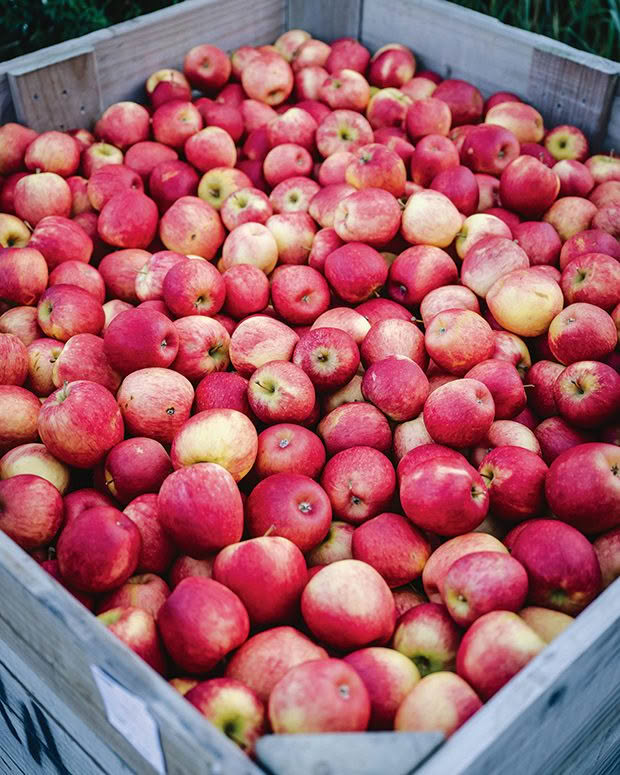
Local second-grade apples are ready to be cold-pressed and sold as bottled juice to take away or enjoy with a meal in the café.
What she endured at the navy diving school — some of it life-threatening, all of it humiliating — had quite the opposite effect on her.
“They did not want a woman to pass the course. That was their goal, and I am 100 per cent sure of that. The stupid thing was, had they not been like that, I might have given up. I gained enormous mental strength by deciding, ‘You guys are not forcing me to quit; I will not give you that joy. You will have to pass me or send me home in a body bag.’” Less than 50 per cent of her intake (in which she was the only woman) graduated, and there are still very few female graduates of the Royal New Zealand Navy Diving School.
It is 2007, and Angie is facing the reality of her new life as a failing greengrocer, knowing that to survive, she must make money from every piece of fruit and each vegetable.
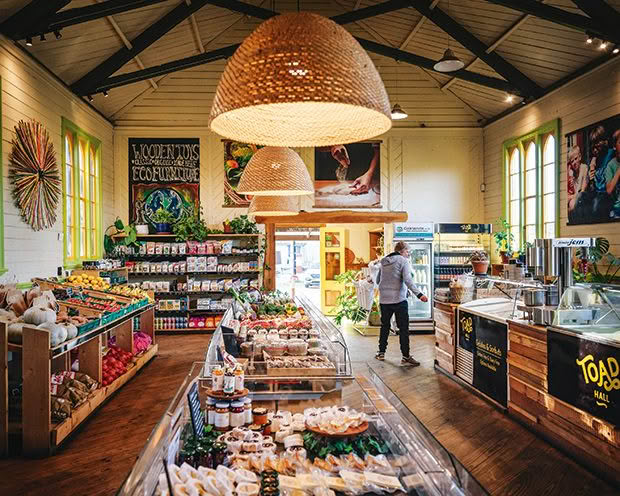
Fresh produce and unique New Zealand-made items are the keys to the café and store’s popularity.
“I started turning unsold produce into jams, relishes, chutneys and pickles and installed a real fruit ice cream machine built by a mate. Before I knew it, a couple of high-school kids and I were selling hundreds of ice creams and making 150 toasted BLTs on turkish bread a day. I had no idea of the costings and was probably charging less than it cost me to make them.
“In the second year, we realised cakes and coffee were a thing, so we said, ‘Let’s add them. If they want coffee, they’ll want cakes. If they want cakes, they’ll want smoothies and juices. If they want smoothies and juices, then maybe they’d like a tasty, healthy meal and a beer while their kids play outside.’
“Hamish cleared brambles and gorse and made a playspace for the children. Then he made tables and chairs. Then we needed a playground, and he built that. “And one day he turned to me and said, ‘Oh my God, what have you created here?’
- Barista Tawny Perkins.
- General manager (and Angie’s second-in-charge) Sara Stamojevic.
- Café manager Alexandre Lauzon carries a basket of locally grown mushrooms to the kitchen.
- Head chef Elsje Gillan is, says Angie, the powerhouse that drives the kitchen team and, along with sous chef Jay Watson, is the inspiration behind the menu.
- Jack Stead, with café salts and peppers, has been a waiter at the cafe for four years.
- Jay heads to the kitchen with tomatoes.
- Chef Clement Urquijo, with the ever-popular jumbo sausage rolls, joined Angie from France recently.
“My original crew were such a part of the vision, and everyone experienced phenomenal personal growth because of the exciting train we had jumped on. It was fun, and that team stayed with me for the better part of a decade. Honestly, the business grew by the seat of our pants.”
And this is what it is all about for Angie — the joy of creating a team of people from diverse backgrounds and seeing them grow.
“In the police, everyone is similar as the job attracts a certain demographic of people and personality types. But that is not the case in hospo. See this Samoan boy — he is here on a work visa because he wants to be an All Black and the only way he can stay in the country is to be on a work visa. Two English people left yesterday after six months, and they’d become part of the family. Andreas is here from Italy for six months as he wants to be part of a sustainable business. We have a German lady, a Frenchman, a Slovakian and, of course, all our locals…”
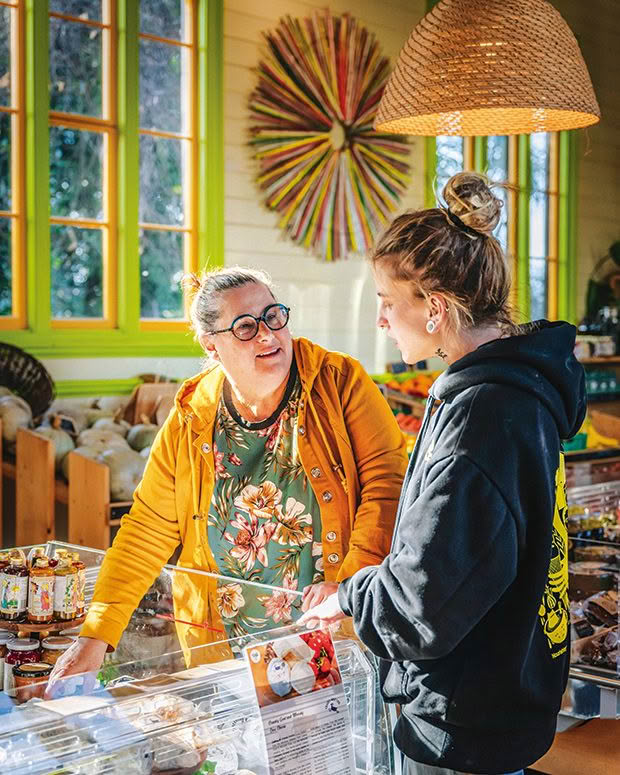
Angie works closely with the Ministry of Social Development, providing placements for people learning to work. Some of them face challenges, mental and physical. She is committed to employing young people in the rapidly ageing Motueka (predictions show that in 2030 the average age will be 70).
“Right from the get-go, every decision had to meet three criteria; nourish our people, nourish our community and nourish our planet. We invest in upskilling locals and giving opportunities to young kids who maybe wouldn’t otherwise have them. We’ve had people working here with ankle bracelets, addicts and people who’ve made bad choices and need someone to have confidence in them and give them a second chance.
“This industry needs people with grit and resilience, and the naughty kids often have a bit more of that. Kids who’ve always had a nice life might get thrown when a customer is rude to them. The truth is that you deal with difficult people every day in hospo.”

So as she stands at the pass on a summer’s evening surveying all that is happening in the bustling world she has created, she could be forgiven for muttering, quietly to herself just as The Wind in the Willow’s Mr Toad himself did: “Glorious, stirring sight. The poetry of motion!” But what stirs her soul is the harmony of it all.
“My staff are flourishing, my gardens are flourishing, and my customers leave feeling amazed that even though the café was packed with 350 people, their meals came on time and were delicious, and the coffee was excellent, and as they leave, they think, ‘What a great place.’ And that’s the joy in it for me.”
WINNING EFFORTS
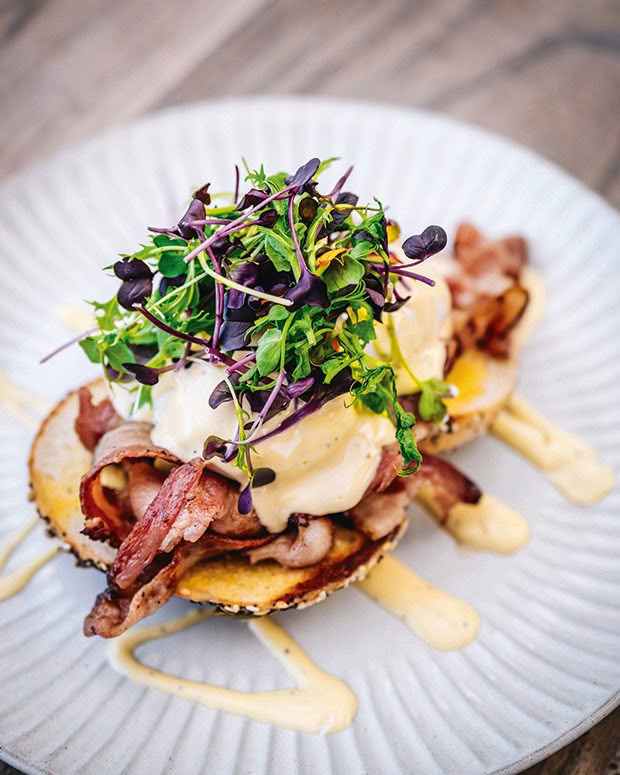
T.O.A.D Hall was named the country’s Best Café at the 2023 Hospitality Awards for Excellence, an accolade that strengthened Angie and her team’s commitment to what she calls three “nourishments”: food, people and planet. The purpose is to:
◆ Produce nutritional food
◆ Create a sense of belonging, and provide purpose and growth opportunities for staff
◆ Make a minimal environmental impact by growing or making all food onsite, composting waste, using recyclable and biodegradable packaging (unless food safety regulation requires otherwise), sorting waste for recycling, crushing waste glass, creating solar power and using local timber for furniture.
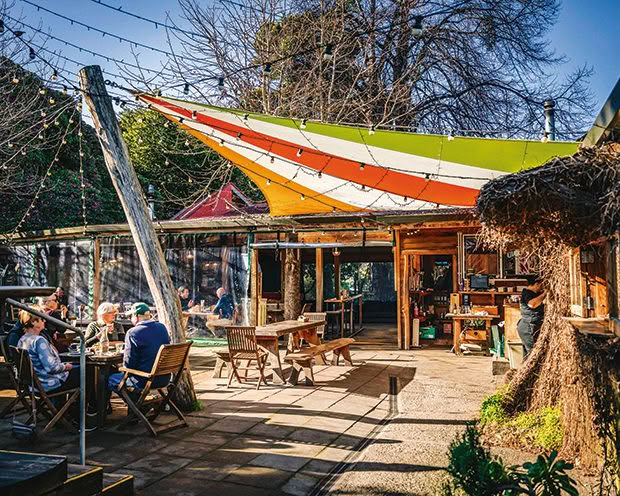
Live music and pizza nights, where the large outdoor area is strung with coloured lights, are so popular that bookings are required.
Love this story? Subscribe now!
 This article first appeared in NZ Life & Leisure Magazine.
This article first appeared in NZ Life & Leisure Magazine.
